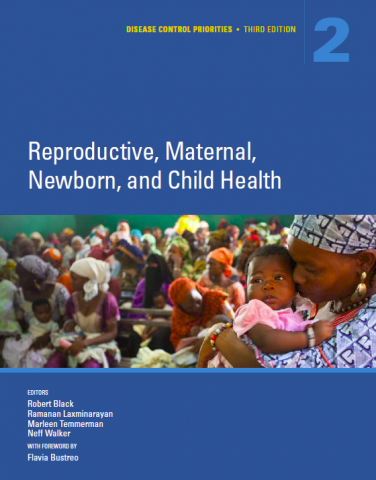For immediate release: Saturday, April 9, 2016
Contact: Brianne Adderley info@dcp-3.org

SAN FRANCISCO, CA - Investing in quality childbirth and family planning can quadruple returns on investment by reducing maternal and neonatal mortality, preventing stillbirth and reducing disabilities, according to new findings presented in the forthcoming volume of Disease Control Priorities, 3rd Edition (DCP3) on Reproductive, Maternal, Newborn, and Child Health (RMNCH). Dr. Marleen Temmerman, volume editor and Chair of the Department of Gynecology and Obstetrics at Aga Khan University, Nairobi says, “While we have seen large reductions in maternal and child death over the last few decades, progress could be accelerated by making a suite of essential, cost-effective interventions more widely accessible. We found that scaling up interventions from existing levels to 90% coverage would avert 149,000 maternal deaths, 849,000 stillbirths, 1.5 million neonatal deaths and 1.5 million child deaths in the current year.”
Published by the World Bank Group, the DCP3 RMNCH volume considers the impact on maternal, newborn, and child deaths and illness, as well as the cost and cost-effectiveness, of scaling up interventions and delivery platforms. The volume highlights contraception, labor and delivery management, infectious disease treatment, and management of severe acute malnutrition as a few of the highest priority interventions for low-income countries.
These services are included in DCP3’s essential packages for maternal, newborn, and child health for low-resource settings. The packages emphasize the importance of cost-effective interventions to promote growth and development. Dr. Robert Black, lead volume editor and Director for the Institute of International Programs at Johns Hopkins University’s Bloomberg School of Public health, hopes that this volume will change how resources are allocated to reproductive, maternal and child health conditions. “The high priority interventions addressed in our volume’s three essential packages are affordable in low-and middle-income countries and can be implemented for $3.9 –6.7 USD per capita. Specifically, the interventions that have the highest impact on deaths include labor and delivery management; care of preterm births; infectious disease treatment; and severe acute malnutrition management.”
Volume editors and authors will present the volume’s key findings today in a panel discussion at the Consortium of Universities for Global Health (CUGH) conference in San Francisco. Speakers include editors Drs. Temmerman and Black, as well as chapter authors Drs. Li Liu, Zulfiqar Bhutta, and Alex Ezeh. DCP3 series editor Dr. Dean Jamison will provide opening remarks, and editor of The Lancet, and DCP3 Advisory Committee member Dr. Richard Horton, will chair the session.
The full DCP3 series is comprised of nine individual volumes that will be published in 2015-2016. For more information or to download chapters, visit www.dcp-3.org/RMNCH and follow DCP3 on Twitter using @DCPthree and #DCP3.



